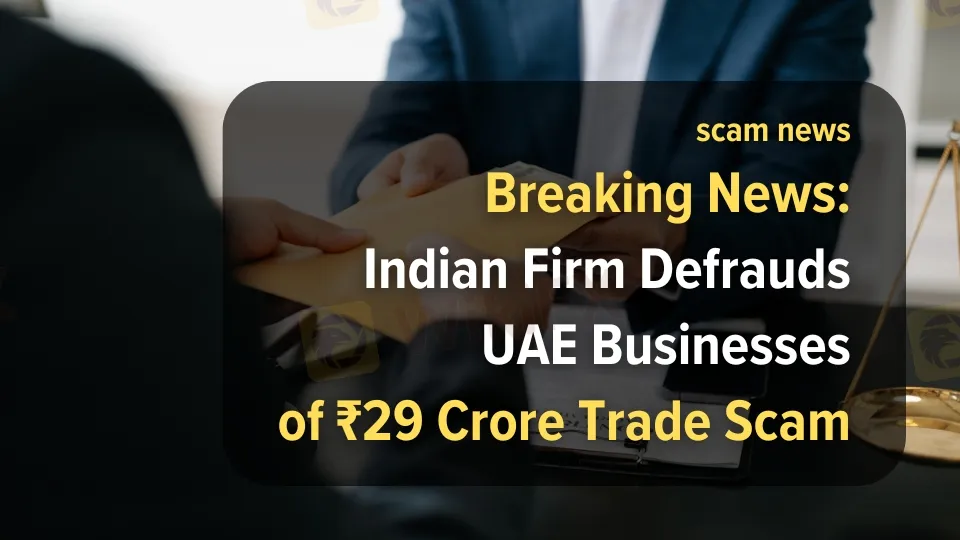简体中文
繁體中文
English
Pусский
日本語
ภาษาไทย
Tiếng Việt
Bahasa Indonesia
Español
हिन्दी
Filippiiniläinen
Français
Deutsch
Português
Türkçe
한국어
العربية
Breaking News: Indian Firm Defrauds UAE Businesses of ₹29 Crore Trade Scam
Abstract:Indian firm defrauds UAE businesses in a ₹29 crore trade scam. Details on victims, modus operandi, and police investigations.

An Indian-owned company is accused of scamming over 200 businesses and people in the UAE of items worth 12 million Dirhams (roughly ₹29 crore), according to Khaleej Times. This enormous trade swindle has destroyed suppliers and placed authorities on high alert.
Fraudulent Trade Scam Targets UAE Businesses
Which was once situated in Dubai Silicon Oasis (DSO), vanished abruptly, leaving behind its offices and warehouses. Initially, the organization established confidence by making small cash purchases before moving on to larger transactions on short-term credit backed by post-dated checks. These cheques eventually bounced, leaving vendors with no money and hollow promises.
High-value products purchased included iPhones, laptop computers, building supplies, and even 15,000 towels. The victims uncovered the swindle when the company's representatives vanished two weeks ago.
Businesses Suffer Heavy Losses in Trade Fraud
One victim, a Pakistani entrepreneur who provided meals, stated, I believed them since they paid 300,000 Dirhams up ahead. Now I've lost stuff valued at 800,000 Dirhams.

Similarly, Wajeeh Shahid of MMC Global Information Technology lost 267,000 Dirham. “The first cheque cleared without any problem, which made them look genuine,” Shahid revealed.
Another victim, Jernaus Britto of Offsetfi Trading, who lost 78,000 Dirhams in computers and network cables, said, “They presented fake audit reports to establish credibility.”
Fraud Linked to Defunct UAE Companies
It was tied to two more bankrupt firms, according to police investigations: Royal Luck Food Stuff and Harbine Middle East Marine Services. Prior to their disappearance, both companies engaged in identical fraudulent practices. Victims also tracked down some stolen products to a warehouse in the Sharjah Industrial Area, only to discover that the current owner claimed to have legitimately acquired the items. This exacerbated the recovery process for cheated firms.
The swindle has damaged companies in a variety of industries, including IT equipment, food supplies, and hotel-grade linens. A Lebanese supplier who lost 180,000 Dirhams' worth of towels expressed his dissatisfaction, adding, “This has shaken our confidence in new buyers.”
For Mohammad, a sales agent for a Chinese corporation, the consequences were personal. His company sacked him after squandering 52,000 Dirhams on power equipment, jeopardizing his job.
Final Thoughts
This serves as a sharp reminder of the value of conducting thorough due diligence in commercial dealings. Authorities are investigating, but the victims' path to justice and rehabilitation is uncertain. As fraud instances get more complex, trust must be balanced with prudence to avoid such catastrophic losses in the future.

Disclaimer:
The views in this article only represent the author's personal views, and do not constitute investment advice on this platform. This platform does not guarantee the accuracy, completeness and timeliness of the information in the article, and will not be liable for any loss caused by the use of or reliance on the information in the article.
Read more

Nonfarm Data Lifts Market Sentiment, U.S. Stocks Rebound Strongly
U.S. nonfarm payrolls for May slightly exceeded expectations, stabilizing investor sentiment and easing fears of a hard landing. This upbeat data sent U.S. equities broadly higher, led by tech stocks, with the Dow and S&P 500 posting significant gains. However, behind the optimism lies a fresh round of market debate over the Federal Reserve’s rate path, with uncertainty around inflation and interest rates remaining a key risk ahead.

OctaFX Flagged by Malaysian Authorities
OctaFX has been officially listed on warning lists by both Bank Negara Malaysia (BNM) and the Securities Commission Malaysia (SC). These alerts raise serious concerns about the broker’s status and whether it is legally allowed to operate in Malaysia.

TradingPRO: A Closer Look at Its Licences
In an industry where safety and transparency are essential, the regulatory status of online brokers has never been more important. For traders seeking to protect their capital, ensuring that a platform operates under recognised and stringent oversight can make all the difference. Keep reading to learn more about TradingPRO and its licenses.

Oil Price Breakout Incoming? Investors Should Stay Alert
Oil prices are hovering around a critical level, with potential yet to be fully unleashed. Investors must prepare for sudden changes.
WikiFX Broker
Latest News
SkyLine Guide 2025 Malaysia: 100 Esteemed Judges Successfully Assembled
Vantage Markets Review 2025: Trusted Forex and CFD Trading Since 2009
Why STARTRADER Is Popular Among Traders?
A Guide to Intraday Forex Trading You Can't Miss Out
CONSOB Blocks Access to 13 Unauthorized Investment Websites
TradingPRO: A Closer Look at Its Licences
The world could be facing another ‘China shock,’ but it comes with a silver-lining
New SEBI Regulations on Intraday Trading
Everything You need to know about Barath Trade
IronFX Broker Review 2025: A Comprehensive Analysis of Trustworthiness and Performance
Currency Calculator


